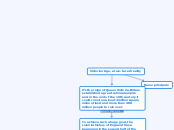Victorian Age, a two-faced reality
To criticize the behavior of society in this period, many writers and poets published social commentary texts, either with explicit or implicit criticisms. One of these authors is R.L. Stevenson, Scottish, in conflict with his social environment, eccentric. One of the first 'bohemians', he criticized the hypocrisy of the time in his novel 'The strange case of dr. Jekyll and mr. Hyde'(1886). The concept was pretty simple, a scientist discover the way to split the human personality creating two different alter egos; eventually the evil part ends up controlling the other one and the protagonist has suicide as only way out.
it's the reign of Queen Victoria, Britain established a great colonial empire and in the end of the 19th century it could count on about 4 million square miles of land and more than 400 million people to rule over.
To achieve such a huge goal, the colonial history of England has a beginning in the second half of the 16th century, with the so called 'plantations', the settling of English and Scottish in the originary Irish lands.
The English domain in India was strict and did not leave space for rights or freedom and this led soon to an inevitable rebellion that was given the name of 'Indian mutiny'. After the riot was stilled in 1857, India came directly under the government of Britain and Victoria was crowned 'Empress of India' by minister Disraeli. The title continued until India achieved indipendence in 1947.
The works of the colonial writer Rudyard Kipling (The Jungle Book) underlined the major theme of the 'white man's burden', the conceited belief that the white man (the western world ) could bring prosperity and civilize the colonialized. The 'third world' could count on the resourceful force of the industrialization but are well-known the actual conditions of the third world. The poem was published during the war for the conquest of Philippines by United States in 1899.
Aside form Indian territories the British empire stretched throughout Asia as it included parts of China, the southeast areas of Asia, such as Burma, and Australia. During the African scramble that saw all of African territories being disputed between European Powers in a race for lands, England focused on Egypt to preserve its routes to India through the Suez Canal. There was a war in South Africa (the Anglo-Boer war) for the control of gold and diamond mines won by the British.
In the late 19th century there was a feeling of patriotism and civic pride that spread through the whole England territory. The main idea that was circulating at the time was that England had the divine right to rule over other populations -and just by looking at the so distant horizons of the Empire, it was easy to find an apparent confirmation.
With the empire reaching the peak of its power in the second half of the 19th century, some ideological conflicts and changes affected the confident attitude that characterised the first part of the Victorian age. Besides many scientific discoveries and inventions, one theory in particular caught the attention of both the scientific and the religious communities; when Charles Darwin published 'On The Origin Of Species' first, followed by 'The Descent Of Man And Selection In Relation To Sex' the entire religious system, without speaking of the scientific one, was put under discussion. He hypothesized that not only the creationist model was not true but that evolution followed the rule of 'survival of the fittest' and moreover that man came from the apes. This caused a lot of mockery and while there were divergences concerning what to believe and what to criticize, the British empire used arguably the thesis of Darwin to justify its actions.
People living in big cities were worried about the rising crime rate and that led the government to enact the Prison Acts, to have full control over jails, and establish new police forces to stop the frequent offences and garrotte robberies, although press with its influence nation-wide could easily create terror and scandals. When it came to the murders of Jack the Ripper, confined to an area of London, fear spread all over the country. Violence, especially if connected to sex sold newspapers.
